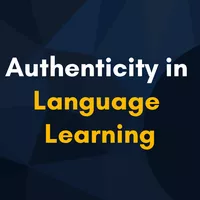Authenticity in Language Learning
Your language will grow if you can access authentic content.
Hi there, Steve Kaufmann here today and today I want to talk about
authenticity in language learning.
Remember if you enjoy these videos, please subscribe, click
on the be for notification.
And if you follow me on a podcast service, please leave a comment.
I do appreciate it.
So what do I mean by authenticity?
When we learn a language, when I learn a language, and again, I'll quote from
Stephen Krashen, where we had our, uh, we had a very interesting discussion he...
and you can see it here at YouTube, a live stream a few days ago.
And he talked about the importance of meaningful communication, meaningful.
So if you have a communication where you are forcing yourself to talk
about the weather, uh, or you're listening to things of no interest to
you, those are not meaningful to you.
You wanna perhaps be choosing something of interest because that something
of interest is going to carry the language into your brain because it's
meaningful because it's authentic.
And I've often said that one of the faults that many language learners exhibit is
this unwillingness to leave the comfort of the starter book, the learner language.
To some extent it's unavoidable.
When I start into a language, I do my mini stories.
I spend three months on the mini stories.
I listen to them often.
There's lots of repetition.
They are not authentic but they have a lot of repetition.
You need that to get started.
That's kind of like the springboard, you bounce two or three times on
this diving board, but once you're up in the air, once you're, you know,
launched, you've gotta go find authentic content and your language will grow
if you can access authentic content.
And I mentioned to Dr.
Krashen in our study, or in our conversation rather that I've never
understood why in schools here in Canada, these schools won't offer a language if
they don't have a certified teacher for that language, as if only the teacher
can provide explanations on the language, content in the language and so forth.
The reality is the internet is full of authentic content.
Uh, I, for my Arabic, I've found this, I've mentioned before this Jordanian
cartoon series, which I listen to.
I listen to podcasts.
I listen to material on, uh, I'm doing one right now, a podcast in Persian
uh, Iranian identity on, uh, the, uh, Islamic revolution in 1979, another one.
These are all authentic materials.
So I am dis...
sort of learning things of interest to me in the language that's authentic.
That's how we learn.
There's no reason why in a school, if they had a, a person familiar with
how the internet can be used to learn language, people could be accessing
authentic content at their level cartoons for kids, whatever the case may be.
And therefore these kids at a school without having a certified teacher for
let's say Spanish or Portuguese could be studying those materials at the school.
As long as the teacher or language coach was familiar with what's
available and maybe there would be a network of, of teachers who would be
helping each other find this kind of material, authentic material at an
appropriate level so that, uh, kids who are motivated to learn will learn.
Because accessing authentic material is extremely motivating.
I also mentioned in our conversation with Dr.
Krashen that in Canada, and this may not be unique to Canada, but kids
are almost forced to learn French.
You know, French is a, an official language.
So you're asking kids to learn French because it's, because
it's an official language.
It's, it's what, their civic duty to learn French?
That's not very motivating.
However, if you can find authentic content of interest to all these
different learners, and their interest may vary there might be many different
languages that they're interested in that with that kind of material
they are going to learn better.
So I think this idea of authenticity, authenticity in the materials that we
use and authentic typically is going to mean aimed at the native speaker,
but it can be children's cartoons.
It can be a cooking show.
It can be, um, things on politics or history or literature or short stories,
whatever it might be: authentic.
And with the kinds of tools that are available today, such as online
dictionaries, MP3 players, uh, LingQ and, and more the ability
to access authentic material is much, much better than it ever was.
It used to be you would have to find, you know, a reader with a
glossary and hopefully not too difficult and a graded reader and,
and gradually work your way up.
But nowadays it's possible to access genuinely interesting, authentic
material much, much earlier.
And so I think we should aim for authenticity.
I think language teachers, independent teachers, online teachers at school should
be looking for ways that they can help their learners access authentic material.
And I think that is going to lead to better results than keeping them
in, uh, traditional a sort of a traditional textbook environment.
Thank you for listening.
Bye for now.

